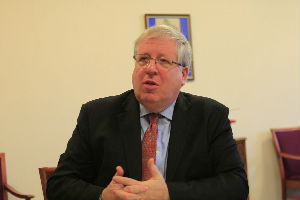Public must be free to file pollution lawsuits
Updated: 2013-10-23 21:46
(chinadaily.com.cn)
|
|||||||||||
The third draft amendment to the Environmental Protection Law is being reviewed by legislators. However, the most controversial clause in the second draft, stating that only State-run organizations have the right to bring public interest lawsuits, remains almost unchanged. A column in Beijing News advocates lifting the restriction so as to better tackle pollution (excerpts below).
Months ago, when the second draft of the Environmental Protection Law was being reviewed, one special clause, which allowed nobody but the All-China Environment Federation to file public interests lawsuits, aroused widespread doubt and criticism. Scholars and journalists called for the right to be expanded to more people and organizations, thus making environmental protection more effective.
The third draft now appearing before our eyes has edited the clause — at least literally. It granted the right to "all national social organizations that have been working in their field for over five successive years, with good credits and registration in the State Council".
The editing looks good, but a quick review reveals that only the ACEF and a few State-run organizations of its kind meet the standards. Ordinary residents and non-State organizations are still excluded.
That's far from enough. Ordinary residents are often the victims of environmental pollution, but it is often difficult for them to collect sufficient evidence to prove a direct relationship between pollution and their poor health. Thus they often face the dilemma of seeing their home being polluted but being unable to sue the factories nearby.
To effectively curb pollution, it is necessary to grant the ordinary people and social groups the right to sue those who pollute the environment and make them pay for their deeds.
Hopefully, legislators will consider the interests of the public and lift the ban on them bringing public interest lawsuits.
Related Stories
Beijing to ban half of private cars on high-pollution days 2013-10-23 00:42
Most Chinese cities suffer air pollution in Q3 2013-10-22 20:05
Beijing adopts emergency response for air pollution 2013-10-22 20:03
Flexible working hours in Tangshan amid pollution 2013-10-22 18:54
Today's Top News
Provinces to decide on privately owned banks
Simulated stock index option trading offered
HK growing in popularity for foreign companies
China's US Treasury holdings hit six-month low
China, Russia reach big oil deal
Apple unveils new Macs, iPad
Officials promote power relations
Efforts lauded in child porn bust
Hot Topics
Lunar probe , China growth forecasts, Emission rules get tougher, China seen through 'colored lens', International board,
Editor's Picks

|

|

|

|

|

|





